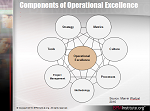Implementing operational excellence so that the organization benefits is an important question that needs close examination. An operational excellence initiative requires many elements. The model requires the implementation of:
1. Program—What are you deploying and how will you manage it?
2. Leadership—How will leadership lead the program?
3. Processes—What will you be improving?
4. Measurements—How will you know when you are successful?
5. Projects—How will improvement work be parsed into actionable and manageable units?
6. People—After these steps have been thoroughly planned and evaluated, what you have learned will be the foundation for:
7. Strategy—How will you deploy the initiative?
























